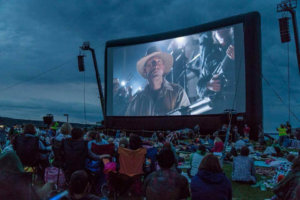 Classic films can be given a new meaning and inspire greater appreciation with the use of large movie screens.
Classic films can be given a new meaning and inspire greater appreciation with the use of large movie screens.The type of programming you exhibit on your outdoor event’s large movie screens will obviously say a lot about your planning committee and its vision. You can appeal to all kinds of viewers by emphasizing a certain quality that the big screen brings out in a movie that doesn’t necessarily come across in smaller media. For example, musicals can be seen in terms of their lavishness and action movies can be said to show off the full glory of their special effects in this grander medium.
But when it comes to older films in general, the screen itself might be all the argument you need. That sentiment comes partially from film reissuer Nick Varley, who, in an article written recently for the Telegraph by David Gritten, describes what he views as the necessity of seeing “the classics” in the sort of theatrical settings in which they first appeared.
Varley, whose company distributes older movies for re-release in theaters, evokes the reasons audiences need to be in front of large movie screens: not just for the picture itself, but for the feel of a crowd.
“With ‘Casablanca’, for instance, everyone thinks they’ve seen it,” he says. “And maybe they have, on television. But when you watch it in a theatre with an audience, it’s totally different. The script is so clever and witty, you find yourself feeding off the audience’s emotions and laughter.”
You can help unlock lost dimensions of such movie mainstays this way by providing a link to the traditions of cinema. Whatever movie screen rental you choose, you can use it as a chance to enhance an audience’s understanding of both a particular film and a way of filmgoing.